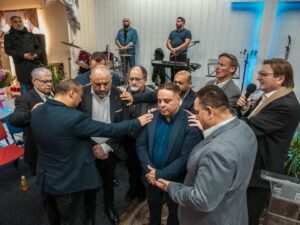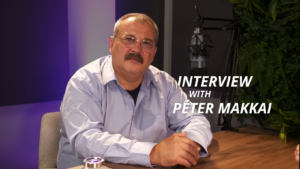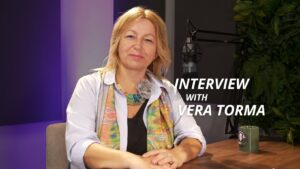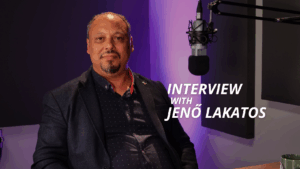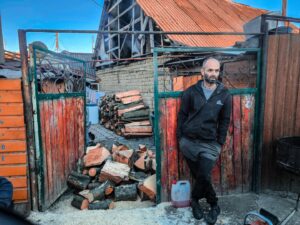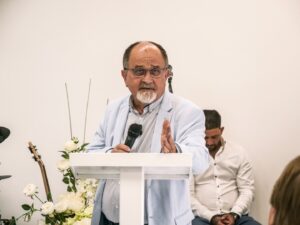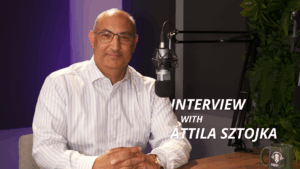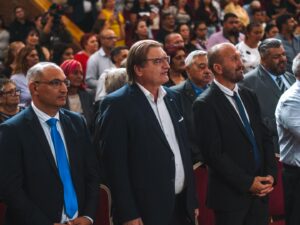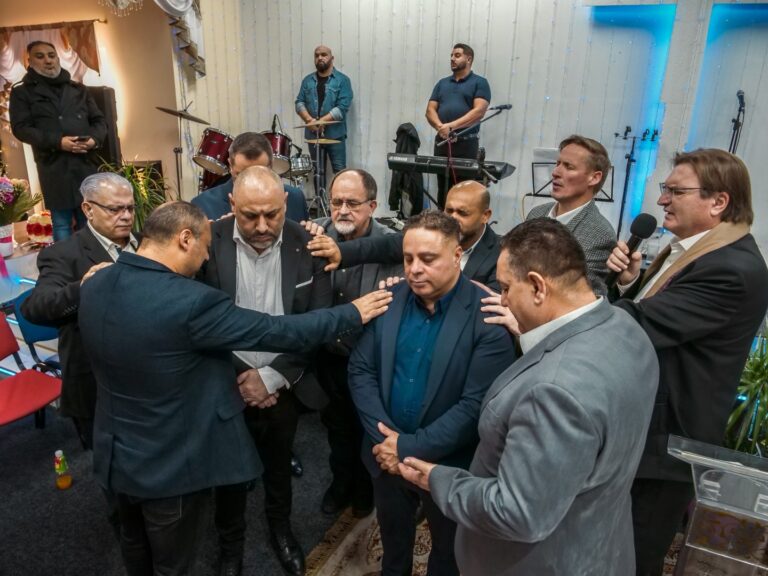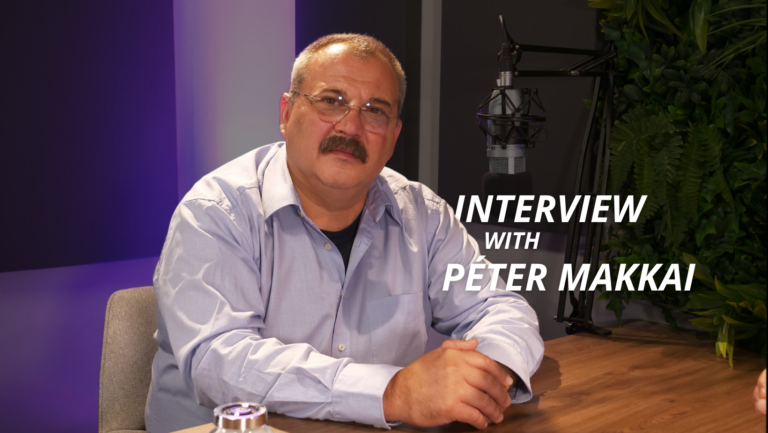Our fifth podcast guest is someone whose life underwent a complete transformation after his conversion. Jenő Nagy, who grew up in a Roma settlement, came into contact with drugs at a very young age. It wasn’t long before he began not only using various substances but also distributing them. Despite making a lot of money, he endured severe suffering, which led him to attempt suicide multiple times. There were times when he earned hundreds of thousands of forints in a single day, and other times when his feet nearly froze because he couldn’t afford a pair of winter shoes. However, God didn’t let him be lost. After his conversion, he gradually turned away from his sins, was healed from schizophrenia, and today, his life and family are restored. He now works with the Pentecostal Roma Mission and speaks about God’s grace wherever he goes. He proclaims that Jesus Christ is truly alive, and just as He set him free, He can also liberate others.
You grew up with six siblings. Can you tell us about your childhood?
Yes, I grew up in a large family. We didn’t have much, but there was always love. Of course, with seven of us, there were bound to be conflicts, but I can still say that I was happy and really enjoyed being a child. I’m very grateful for the experiences I had growing up. Both my mother and father always loved us and were there for us. Of course, there were challenges—my father, and it’s no secret, struggled with alcohol, and we often saw them argue. But despite that, the way they raised us set an example for me. It’s a life that still gives me strength today.
Despite that, your life took a wrong turn at a young age. You even became familiar with substances quite early, and if I’m right, you were part of a gang.
I grew up in one of the worst, or toughest, areas of Békés. People often say I was raised by the streets, and we really were out there on the streets. For us, it was even a kind of hobby. For example, when we grouped together as kids in the gang, we would go to the dump, or go dumpster diving, or just find ways to get by from one day to the next. Sometimes, we even tricked people or did things just to survive from day to day.
Did you face discrimination at school because of your ethnicity?
Being Roma was always a part of my life, everywhere I went. I never tried to hide it because I am grateful to God for making me Roma. I wouldn’t want to be anything else because I know that God created me this way, and I am not ashamed of it. In school, there were always two groups: one for the Hungarian kids and one for the Roma kids. Naturally, I belonged to the Roma group.
I assume you didn’t enjoy studying much.
It wasn’t just studying that I didn’t like—I didn’t enjoy going to school at all. I spent more time outside of school than actually attending classes. I barely even remember those school years because, during that time, a disease came into my life. It was epilepsy. It happened quite often that I would lose consciousness and have seizures, and several times I woke up in the hospital days later. This made my life bitter—I was sad, and I felt like I didn’t belong anywhere. I never knew when another seizure would come, so I started living in fear of it. I was also envious, seeing others laughing, having fun, and being confident in that community. That’s when I first got introduced to drugs.
So the kids were smoking weed, and that became completely normal?
Yes, it became quite normal. When I saw that it made them happy, I wanted to try it too. The first time I tried it, I felt really good, and I wanted to use these substances more and more often. This started to become a regular pattern in my life because it made me feel good. I stopped thinking about my illness or the discrimination I faced. But weed already cost money back then, and since we weren’t rich, I couldn’t afford to buy it myself. So, I began to scam people for money or go out stealing with friends. We kept getting deeper and deeper into crime just for that. Eventually, no matter how much weed we bought, it was never enough.
The big low point came when you went from being a user to becoming a distributor as well, right? Or did you make some of the drugs yourself?
I started with weed, but that was just the beginning. After that, we began trying other substances because one drug often leads to others. We had to get involved in a lot of thefts, break-ins, and robberies just to get our fix. When I realized that no matter what I did, I couldn’t get enough drugs, I started thinking about how I could make more, so it would always be enough. At first, the goal was just to have enough for myself. But when I started making and dealing the stuff, I realized I could make money from it.
Can you give us an idea of how much money you were making and what your life was like when things were going well?
By the time I started making bigger money from dealing, several years had already passed. By then, I was married and had two children. Back in those days, I was earning around 300,000 forints a day from dealing.
For people outside of that world, it’s hard to understand how widespread it is. What’s your perspective? Is it very common? And as I believe you mentioned, drugs are very cheap now, right?
Yes, unfortunately, today people can get drugs for just a few hundred forints. I see that in today’s world, people start using these substances as early as 11 years old, and sadly, people can become addicted after just one use. It’s terrible what drugs can drive people to do—just to get their fix. I was also forced into many things because of it. Most people don’t even realize the consequences this can have on their lives.
So even at a young age, around 11 or 12, this can already be a danger for parents. How do you think they can protect themselves and their children from it?
I believe that parents need to pay closer attention to their children, because there are definitely signs. When someone starts using drugs, if we don’t notice the signs, they can very easily become addicted. I had to deal with this with my own children. I was a cautionary example for them. My eldest son, who is now turning 19, also tried drugs. I had to sit down and talk with him. I had to explain that I wasn’t setting these boundaries or forbidding things because I didn’t love him, but because I wanted to protect him. I told him, and I was able to convey with love, what the consequences of drug use can be. In my life, I developed several illnesses—schizophrenia, dissociative disorder, depression, paranoia—and my teeth started falling out, I lost weight, and the same things can happen to anyone. I told my son that he’s also at risk of experiencing these things. I know that the only way to reach people and help them resist drugs is with love. I’m grateful to God that I was able to see when my son started down this path, and I’m thankful that love was able to bring him out of it.
In the end, you reached the point where you hardly had any sober moments, and you attempted suicide several times, right?
Yes. The truth is that drugs robbed and hid from me all the values that God had freely given me, because at that time, I believed no one loved me. I tried to kill myself in several ways, taking hundreds of pills, eating poison, and attempting to end my life.
But then the moment came when you called someone from the Grace Church. How did that happen?
Well, that moment was quite interesting because after one of the suicide attempts, I received a phone number for one of the leaders of the Grace Church, István Kis, who is currently my boss at the GypsyAid of the Hungarian Gypsy Missions International. When I called him, I thought he wouldn’t even talk to me because everyone knew I was a drug addict and dealer. But when I told him over the phone that I was seeing demons, hearing voices, and wanted to kill myself, he told me to meet him that same day. I met him, and one of my friends, who was struggling with similar issues, came along with me. Pisti shared the same gospel with both of us, and prayed for us the same way. One of us went back to that life, but I said I wanted to know this Jesus he was talking about.
And what happened next? How did your life change?
Well, after I said I wanted to know Jesus, things got pretty hard because I had been a drug addict for more than ten years, and the withdrawal symptoms were terrible. My skin was burning, my bones hurt, I felt nauseous, I was constantly vomiting, I couldn’t walk, sleep, eat, and it was getting harder and harder. For days, I kept vomiting, the acid from it had corroded my esophagus and the roof of my mouth, and even breathing became painful. But I received new life from Jesus. When I went to the fellowship, the people welcomed me with love, they hugged me, and it was so surprising to me because I hated them. Yet, they saw me, welcomed me with love, and their love shocked me. I sat in the back row, and by the end, I was also praising. Then I had a spiritual touch when God healed me, took away those symptoms, and after that, I could eat, drink, sleep, and rest. A process began in my life that I am very grateful to God for. He freed me from drugs and various harmful addictions, and He healed me of every disease. The doctors had all said that the diseases I suffered from were incurable. But God healed me instantly. He gave me a new life, a life free from illness.
It’s amazing that you’ve been healed from all your serious illnesses!
Yes, glory to the Lord, that through Jesus Christ, I was healed from all diseases, so there is no illness in my life. Glory to the Lord, that I have now passed my driving test for a car and for a forklift as well, and I have been able to participate in several types of training at the HGMI. Recently, there was a Community Transformational Leadership Programme that I also took part in, and it was very useful for me. The things we learned there are now being applied in the house groups we conduct here in Békés County.
Your wife stood by you throughout, and you have two grown children.
Yes, I have a wife and two children. My wife and I work together at the GypsyAid. My elder son will be 19 years old, and my younger son will be 17 years old and is currently studying in a law enforcement program. I am very grateful to God for them and for giving me such a wife. I know that if it weren’t from Him, she wouldn’t have stuck by me. She stood by me even when I was using drugs, even when they found me collapsed on the street, or when the police or commandos took me away. She was always by my side, and she was the one who mostly raised our children because I wasn’t taking care of them. She did everything she could to provide for them, and I am grateful that God appointed such a partner for me.
How do you feel working at the GypsyAid of the Hungarian Gypsy Missions International, and what does this job mean to you?
I am incredibly grateful to God for this job. It’s more than just a job—it’s a calling, a chance to make a real difference. We deliver donations to people in need, and I’ve seen firsthand how those donations can transform lives. I know what it feels like to receive help. I understand the impact it can have when someone is on the verge of losing their children. When we hear about situations like that, we can step in with love, bringing things like furniture, carpets, or beds, and help them turn their lives around. I’m thankful for the work I get to do here at the Roma mission because I see God’s hand at work every day—whether it’s in conversations with people or when we share the gospel with them. The street where I grew up wasn’t really being reached before. In another Roma settlement, the gospel was regularly preached, and there were house groups. But on my street, people didn’t know God, and there wasn’t much outreach. I see now that sin has grown, but I also believe that God is preparing people’s hearts. Where sin increases, so do conversions. I’ve witnessed how God is moving and speaking to people. Right now, through the Roma mission, we are holding a house group on this street, led by László Surman. More and more people are turning to the Lord. God loves these people, and I know He hasn’t forgotten about them. I pray for their conversion—not just to turn to God but to be born again and to stay in Christ, because, honestly, there is no other way out of the situation they are in. I also try to approach those who feel rejected with love. I still meet many people who live on this street but are too afraid to approach anyone. If someone tries to reach out to them, they shut themselves off. Glory to the Lord, today they are beginning to come with love because this house group is open to everyone. I know that God has good plans for this street, and I pray that He will awaken the hearts of the people here.




